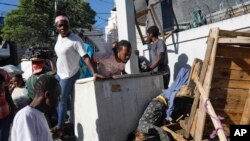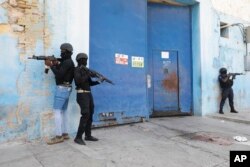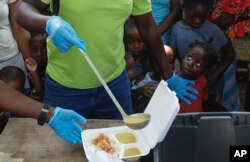Caribbean leaders said Tuesday that all groups and political parties except one have submitted nominees for a transitional presidential council charged with selecting an interim prime minister for Haiti, which remains engulfed in gang violence.
The original nine-member council was whittled down to eight members after the Pitit Desalin party, led by former senator and presidential candidate Jean-Charles Moïse, declined a seat last week. Moïse is allied with Guy Philippe, a former police official and rebel leader who served time in the U.S. after pleading guilty to money laundering.
The Dec. 21 group, which is allied with Prime Minister Ariel Henry, was one of the last holdouts, submitting a name on Monday to the regional trade group known as Caricom. Its nomination had been delayed by infighting as group leaders bickered over potential candidates.
Henry, who remains locked out of Haiti by ongoing gang violence that has closed the main international airport, has promised to resign once the transitional council is created. He was on an official trip to Kenya pushing for the U.N.-backed deployment of a police force from the East African country to fight gangs in Haiti when armed gunmen launched attacks on February 29 in the capital, Port-au-Prince, that are still going on. The Kenyan deployment has been delayed.
Gangs have torched police stations, opened fire on the main international airport and stormed Haiti's two biggest prisons, releasing more than 4,000 inmates. On Monday, they attacked and looted homes in two upscale communities that had previously remained peaceful, killing at least a dozen people during the rampage.
The most recent attacks raised concerns that gang violence would not cease despite Henry announcing nearly a week ago that he would resign once a transitional presidential council is created, a move that gangs had been demanding.
The U.N. humanitarian office reports that the situation in Port-au-Prince "remains tense and volatile" with schools, hospitals and government buildings being attacked and many curtailing operations, Haq said.
He added that the health sector continues to struggle given a lack of medical supplies, health care workers and blood.
Also on Monday, Haiti's power company announced that four substations in the capital and elsewhere "were destroyed and rendered completely dysfunctional." As a result, swaths of Port-au-Prince were without power, including the Cite Soleil slum, the Croix-des-Bouquets community and a hospital.
Scores of people have been killed during the attacks, and about 17,000 people have been left homeless, the majority fleeing to Haiti's calmer southern region, according to the U.N. Office for the Coordination of Humanitarian Affairs.
In addition to selecting an interim prime minister, the council will be responsible for appointing a council of ministers, a provisional electoral council and a national security council. All members of the transitional council also must back the deployment of a foreign armed force.
Those awarded a spot on the council are EDE/RED, a party led by former Prime Minister Claude Joseph; the Montana Accord, a group of civil society leaders, political parties and others; Fanmi Lavalas, the party of former President Jean-Bertrand Aristide; the Jan. 30 Collective, which represents parties including that of former President Michel Martelly; and the private sector.
Of the remaining two nonvoting positions, one would go to a representative of Haiti's civil society and the other to its religious sector.






